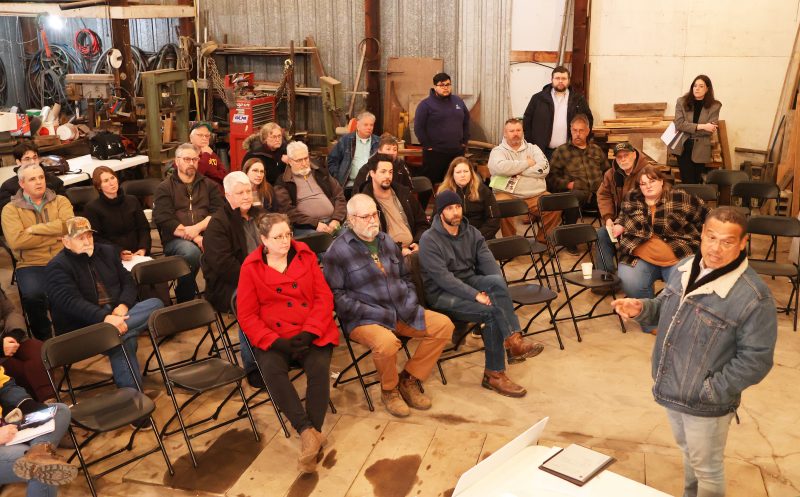DONNELLY, Minn. — As winter winds howled outside, farmers gathered in a machine shed near Donnelly on March 4 to share stories with Minnesota Attorney General Keith Ellison on how consolidation in everything from livestock markets to ag implement repairs is negatively impacting their operations and communities. The Land Stewardship Project (LSP) meeting was held at a time when four large firms handle 85% of all beef cattle purchases and 67% of all hog purchases. Just seven corporations control roughly half of the grain and oilseed market globally. And during the past few decades, the farm equipment manufacturing industry has consolidated at an unprecedented rate, with Deere & Company now dominating the market.
“If you’re operating a small to mid-sized farm, you’re probably not feeling too good about the market being dominated by these giants,” said Ellison, who had traveled to LSP member Greg Fynboh’s farm with some of his staff to hear about how anti-competitive behavior on the part of big ag firms is impacting farming communities. “The winners and losers are clear. I do believe that companies have to obey the rules of fair competition.”
Andrew VanDerPol talked about how John Deere’s control of how the equipment it manufactures is repaired is impacting his family’s Swift County livestock operation. A John Deere tractor the VanDerPols were using “basically every single day” has had two major breakdowns in the past two years. Attempts to repair it have been limited by the fact that John Deere often forces farmers to rely on Deere’s network of authorized dealers for necessary repairs, a situation that can be time-consuming and expensive.
VanDerPol said he would prefer being able to have his farm equipment fixed by a local maintenance shop.
“They’re close to us, they understand the time frame we have,” he said, adding that local repair shops can be part of a vital rural economy. “Being we’re a smaller farm, they don’t push the big guys ahead of us like the dealerships do.”
Ellison said the ability of farmers to repair their own equipment should not be controlled by the manufacturer.
“You bought it, it’s yours. That should be the end of the conversation,” said the Attorney General. On January 15, Ellison’s office joined the Federal Trade Commission and other state attorneys general in suing John Deere over its restrictions related to farmers’ ability to repair equipment. More than a dozen states, including Minnesota, introduced bills to establish right-to-repair agricultural equipment legislation in the first two months of 2025. An informal survey of the participants at the Donnelly meeting showed the majority of respondents felt the lawsuit against Deere was important.
Andrew’s father, Josh, said consolidation in the livestock processing industry has forced his family to focus exclusively on selling their pork direct to consumers, rather than marketing hogs through packers, which prefer to purchase from just a handful of mega-operations via a closed contract system. James Kanne, a retired dairy farmer in Renville County, said that the milk processing business is on the verge of being captured by major dairy firms.
“When they do so, they are going to start excluding all the little guys, which is going to be a major problem for any small dairy that happens to be in the area,” said Kanne.
And putting smaller farms of any type out of business is bad news for rural communities, said LSP western Minnesota organizer Matthew Sheets.
“When you have seven family farms that go out of business in the local community, that is equivalent to one hardware store that doesn’t have enough business in town,” said Sheets. “And it’s not just stores — it’s not enough people in church, not enough people in schools, it’s ripple effects across the economy.”
Ellison agreed that consolidation in agriculture is bad for rural economies, and he said that’s why his office needs to gather concrete evidence that antitrust activity is negatively impacting farmers and rural communities. He encouraged farmers to contact his office with any evidence they have so that an investigation can be started. Complaints can be filed confidentially with the Attorney General’s office at ag.state.mn.us/Office/Complaint.asp or by calling 800-657-3787.
“We do want to establish an open line of communication,” he said. “It’s damn hard, pardon my language, to pull together a strong antitrust case without somebody willing to say, ‘This is happening to me.’ “
-30-
The Land Stewardship Project is a nonprofit organization dedicated to an ethic of stewardship for farmland, promoting sustainable agriculture and developing healthy communities. LSP has offices in the Minnesota communities of Lewiston, Montevideo and South Minneapolis. More information is at landstewardshipproject.org.
